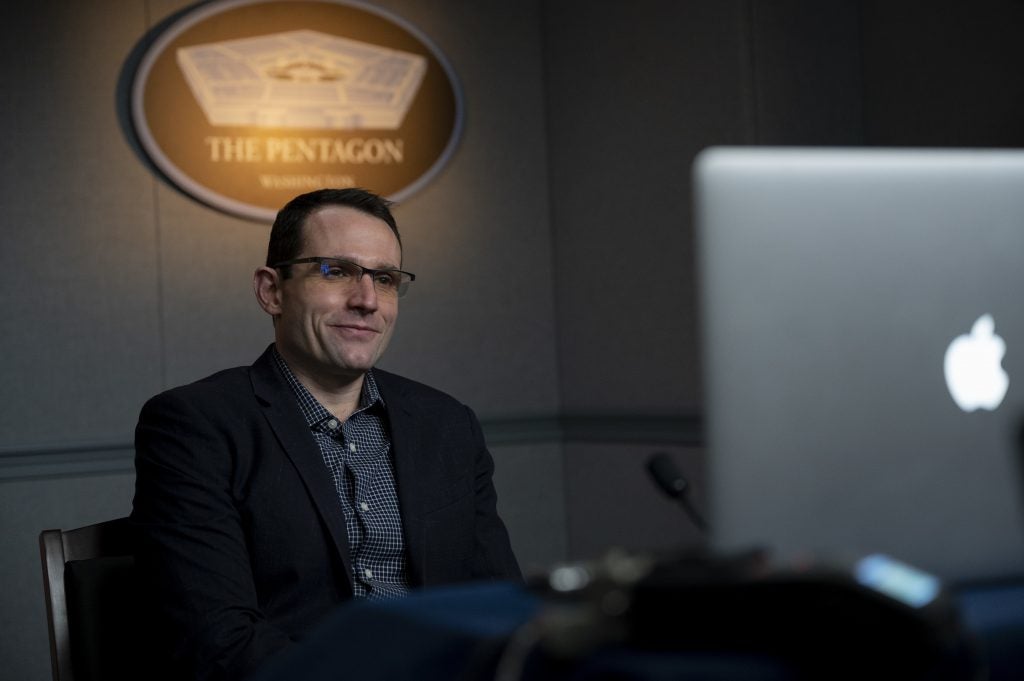“I Cannot Wait To Leave This Job, Believe Me”: A Tale Of Two Appointees
With the impending departure of the Trump administration, the various political appointees in the Pentagon are similarly clearing out their desks. While the jury is still out on whether they could return in some other capacity in the future, what is certain is that some aren’t going to depart without offering up a parting soundbite or two to reporters, with Acting Secretary of Defense Chris Miller’s now-immortal quip from Thursday that “I cannot wait to leave this job, believe me” probably the most striking example.
Meanwhile, Assistant Secretary of the Air Force for Acquisition, Technology and Logistics, Dr. Will Roper has stuck to his well-honed image. In comments to the press on January 14, he said that he intends to complete two more things before his final day on the job on the 19th: guidance for digital engineering of Air Force systems going forwards, and the signing of an acquisition strategy for the ReleaseONE initiative – the first component of the Advanced Battle Management System that aims to relay battlefield analytics and data from satellites to aircraft in the area of operations.
In particular, he claimed that the use of digital engineering for the Next-Generation Air Dominance (NGAD) program could drive costs of sustainment below that of the F-35, saying that the F-35’s “cost of ownership is not where it needs to be”. According to Roper, digital engineering allows for an even more advanced aircraft to be built faster and maintained cheaper, although he would not comment on whether NGAD products would replace part of the planned total Air Force buy of 1,763 F-35s.

While many of the ideas around speeding up military acquisition and adoption of new technology predate Roper’s tenure as acquisition chief, Roper’s public embrace of innovative approaches to procurement and their potential gave him a public persona akin to Donald Rumsfeld’s “transformationalists”, albeit on a smaller scale. While this certainly helped him feature in headlines, it also elicited skepticism in response to his more grandiose claims, as exemplified by how a forecast that the AGM-183 Air-launched Rapid Response Weapon (ARRW) hypersonic missile would fly by the end of 2020 failed to materialize.
Roper’s clean-cut, hype-centric approach definitely has its detractors, Acting Secretary of Defense Miller’s comments, by contrast, show why it might have its place. In a press gaggle on the same day, he commented on the F-35 program in response to a question listing it as amongst several infamously flawed Pentagon procurement programs, saying:
“I so…I mean, I cannot wait to leave this job, believe me. But part of me is like, I would have loved to have gotten involved in the acquisition process and try…and you know, talk about wicked problem. I wanted to take that one on….F-35s, the case study. Although, I gotta tell you, yesterday we were talking to some guy, some lieutenant colonel, or colonel, said ‘what are you flying?’ Said ‘F-35,’ I was like that’s a piece of…and he was like…and he laughed, and I was like, ‘no seriously, tell me about it,’ and he was…an F-16 guy, F-35, he said…’unbelievable aircraft,’ I’m not…I…that investment, for…that capability, that we’re never supposed to use, ‘well, we have to deter, blah blah bluh blah…Are we fifth generation? You know we…I think it’s hilarious, you know, right now, you know, ‘well we need to invest in the sixth generation,’ I’m like, we have created a monster, but you know that.”
That the worst of the F-35’s problems are now behind it clearly isn’t the impression most start with when discussing the program. Granted, with nearly two decades of bad press and several careers made entirely off the back of decrying flaws perceived and real in the aircraft and program alike, poor first impressions are hard to dispel. Yet the US Air Force, Marine Corps and Navy, not to mention Lockheed Martin, have been comparatively subdued on the capabilities it brings to the table today, possibly preferring to let interest from potential customers do the talking instead of engaging in PR hype campaigns like those Eurocanard makers and the Russian United Aerospace Corporation are more fond of.
The rest of Miller’s comments to the press gaggle are only marginally more comprehensible, even as they allude to a large variety of topics that are of interest to both the outgoing administration and the incoming one. The idea of taking a step back and considering issues on a global scale instead of viewing the Indo-Pacific and China as the main focus to the detriment of the rest of the world is hardly bereft of merit, if rather poorly parsed by the transcript.

Another thought mangled by the format is the need for the US to improve its capabilities for competition below the threshold of armed conflict. Miller noted that Russia has “played a really bad hand of cards very, very well” with its operations below said threshold, with their irregular warfare concepts and information warfare approaches standing out to him. Shorn of context, this snippet is now causing a lot of complaining about a senior defense official “praising Russia”.
Certainly, the transcriber at the Pentagon doesn’t appear to have spent much time making it more friendly to readers. An anonymous defense official said to the Washington Post that “The Secretary often uses casual and humorous language with reporters and personnel during travel. That characteristic does not convey well in a written transcript but was obvious to participants”.
Perhaps someone hastily appointed as Acting Secretary of Defense after the abrupt “termination” of his predecessor three days after Election Day was never going to be quotable for the right reasons. With turbulence in DC only continuing to spiral since then, one can hardly fault Miller for his eagerness to leave the job behind, or his willingness to speak freely with under a week left on the job.

